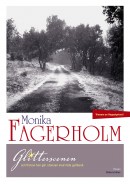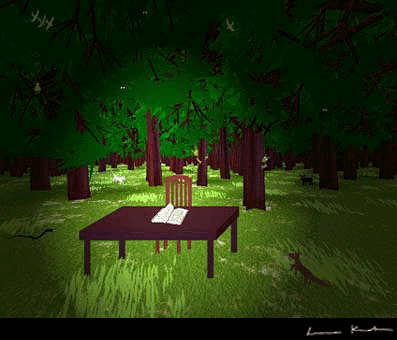Search results for "Что такое нейролингвистическое воздействие больше в insta---batmanapollo"
Monika Fagerholm: Glitterscenen [The Glitter Scene]
17 November 2009 | Mini reviews, Reviews
 Glitterscenen
Glitterscenen
[The Glitter Scene]
Helsingfors: Söderströms, 2009. 407p.
ISBN 978-951-522-467-5
€29.90
Säihkenäyttämö
Finnish translation by Liisa Ryömä
Helsinki: Teos, 2009. 455 p.
ISBN 978-951-851-127-7
€29.90, hardback
In Glitterscenen Fagerholm reveals the shabby details of the murder mystery that was the essence of her celebrated Den amerikanska flickan, The American Girl (2006). In a sense, the two books are psychological thrillers, but they are also much more than that: the American girl’s death is a myth about destruction and creation – a narrative about love, death and glamour that attracts and seduces cohort after cohort of young women in the District, a place somewhere in Finland that is in the process of being transformed from the rural to the suburban. Like no other author, Fagerholm combines the advantages of plot-based realism with the deep psychological excavation of collective dreams and the secret layers of the unconscious. In the centre of the District there is a kiosk where the local priest’s daughter, fat May-Gun, presides over dirty magazines, sickly candy and magnificent dreams. Across the square, eyed by horny small-town greasers, walks young and blonde Suzette. The result is a deadly drama, propelled by grief and narcissism. The Glitter Scene is the goal of our dreams, but also a dangerous place of instant gratification and sudden death.
Indifference under the axe
9 March 2012 | Essays, Non-fiction

In the forest: an illustration by Leena Krohn for her book, Sfinksi vai robotti (Sphinx or robot, 1999)
The original virtual reality resides within ourselves, in our brains; the virtual reality of the Internet is but a simulation. In this essay, Leena Krohn takes a look at the ‘shared dreams’ of literature – a virtual, open cosmos, accessible to anyone, without a password
How can we see what does not yet exist? Literature – specifically the genre termed science fiction or fantasy literature, or sometimes magic realism – is a tool we can use to disperse or make holes in the mists that obscure our vision of the future.
A book is a harbinger of things to come. Sometimes it predicts future events; even more often it serves as a warning. Many of the direst visions of science fiction have already come true. Big Brother and the Ministry of Truth are watching over even greater territories than in Orwell’s Oceania of 1984. More…
The faraway island
31 March 2007 | Archives online, Fiction, Prose
Kaukainen saari, a short story from the collection Elämän ja kuoleman pidot (‘The feast of life and death’, 1945). Introduction by Juhani Niemi
For as long as they could remember, Hannes and Pekka had felt a great fascination for the lonely little island out in the open sea, clearly visible from the shore at home. Thickly overgrown with unusually tall pines, the island was like a wondrous bouquet in a great vase of sea. It was in sunshine from morning till night. At the very instant that the tip of the sun peeped up over the horizon, its rays were already caressing the tops of the little island’s tallest trees, and when the sun set behind the blackness of the islands to the west, those same treetops were tinged with a bright, hot glow. The winds and storms touched it more vehemently than any other place. No matter which direction the wind came from, the island was always defenseless, but, happily, ready for anything. In stormy weather the waves flung themselves against its stony shore and sometimes nearly as high as the treetops. The wind roared in the dense branches of its trees more wildly and violently than anywhere else. When it rained, it was as if the island were hiding among the grey curtains of mist, looming dimly and secretly. In the autumn, when all the other woods were splashed along their flanks with yellow and russet, and gradually undressed until they were half-naked, the little island’s tall pine trees rose up from the grim autumn surf as lush and green as always. And in the winter, when the sea froze and snow covered everything in a mantle of white, the island dressed itself in ice and rimy frost like royal robes covered in millions of sparkling diamonds. More…
Locomotive
30 June 1981 | Archives online, Fiction, Prose
A short story from Dockskåpet (‘The doll’s house’). Introduction and translation by W. Glyn Jones
What I am about to write might perhaps seem exaggerated, but the most important element in what I have to tell is really my overriding desire for accuracy and attention to detail. In actual fact, I am not telling a story, I am writing an account. I am known for my accuracy and precision. And what I am trying to say is intended for myself: I want to get certain things into perspective.
It is hard to write; I don’t know where to begin. Perhaps a few facts first. Well, I am a specialist in technical drawings and have been employed by Finnish Railways all my life. I am a meticulous and able draughtsman; in addition to that I have for many years worked as a secretary; I shall return to this later. To a very great extent my story is concerned with locomotives; I am consciously using this slightly antiquated word locomotive instead of loco, for I have a penchant for beautiful and perhaps somewhat antediluvian words. Of course, I often draw detailed sketches of this particular kind of engine as part of my everyday work, and when I am so engaged I feel no more than a quiet pride in my work, but in the evenings when I have gone home to my flat I draw engines in motion and in particular the locomotive. It is a game, a hobby, which must not be associated with ambition. During recent years I have drawn and coloured a whole series of plates, and I think that I might be able to produce a book of them some time. But I am not ready yet, not by a long way. When I retire I shall devote all my time to the locomotive, or rather to the idea of the locomotive. At the moment I am forced to write, every day; I must be explicit. The pictures are not sufficient. More…
A happy day
12 August 2010 | Fiction, Prose
‘Muttisen onni eli laulu Lyygialle’ (‘Muttinen’s happiness, or a song for Lygia’‚) a short story from Kuolleet omenapuut (‘Dead apple trees’, Otava, 1918)
‘Quite the country gentleman, eh, what, hey?’ says Aapeli Muttinen the bookseller. ‘Like the poet Horace – if I may humbly make the comparison, eh, dash it? With his villa at Tusculum, or whatever the place was called, given to him by Maecenas, in the Sabine hills, wasn’t it? – dashed if I remember. Anyway, he served Maecenas, and I serve – the public, don’t I? Selling them books at fifty pence a copy.’
Muttinen’s Tusculum is his little plot of land in the country. A delightful place, comforting to contemplate when the first signs of summer are beginning to appear, after a winter spent in town in the busy pursuit of Mammon, under skies so grey that the wrinkles on Muttinen’s forehead must have doubled in number. A summer paradise of idleness… More…
The love of the Berber lion
30 December 2008 | Fiction, Prose
A short story from the novel Berberileijonan rakkaus ja muita tarinoita (‘The love of the Berber lion and other stories’, WSOY, 2008). Introduction by Janna Kantola
The lion’s name was Muthul. He was an old Berber lion from the Atlas Mountains. He had a black mane, a black tail with a bushy tip and the scars of many battles on his hide.
He had grown up as a lion cub in the royal palace at Carthage at the time when the Romans, led by Scipio the younger, destroyed the city with fire and sword. The palace was set ablaze, a bloody battle ensued in the gardens, Romans impaled on arrows lay strewn in the rose bushes, Carthaginian blood dyed the water in the fountains. Someone had let all the palace animals, wild and tame alike, out of their cages; they were running around wildly, killing each other in the grip of panic, then disappeared inexplicably. More…
Letters from Klara
31 March 1992 | Archives online, Fiction, Prose
A short story from Brev från Klara (‘Letters from Klara’, Söderström & Co, 1991)
Dear Matilda,
you are hurt because I forgot your ancient birthday: that is unreasonable of you. To put it bluntly, you have expected my particular devotion all these years merely because I am three years younger. But let me now at last tell you that the passage of the years An Sich is no feather in one’s hat.
You pray for Higher Guidance – excellent. But until you receive it, it might perhaps be as well to discuss certain bad habits which are, as a matter of fact, not foreign to me, either. More…
One night stand
31 March 1987 | Archives online, Fiction, Prose
Stories from Yhden yön pysäkki (‘One night stand’, 1985) and Unohdettu vartti (‘The forgotten quarter’, 1986). Introduction by Pekka Tarkka
At the beginning of November it really started to freeze. A month earlier than usual. There was little snow to speak of, but the ground froze hard as bone.
Tamed by hunger, reindeer clustered along the roadsides and on the village outskirts. Many of them ended their misery by flinging themselves under the timber-lorries in the evening dark. Bony and bloody carcasses littered the ditches and field-edges.
Then the snowstorms came. It snowed without stop for nearly two weeks. At times the whole landscape was reduced to a white line. Snowdrifts mounted round the houses and up the snow fences. The reindeer carcasses lay about under the snowbanks, waiting for spring. More…
The Blinking Doll
30 June 1988 | Archives online, Fiction, Prose
A short story from Metsästys joulun alla (‘The hunt before Christmas’, 1982). Introduction by Erkka Lehtola
There was a strong bond between Juutinen and Multikka: both their lives, from their beginnings, had been fragmented and scattered, lacking any solid, reliable points of support. Even their marriages had come and gone; they had left no residue worth remembering. As in the old parable, their lives resembled the trail a skier leaves in fresh snow in a blizzard: behind him, it disappears in a few moments without a trace, and ahead and on either side there is only pristine density and no one or nothing one might follow. More…
That remarkable man
31 December 1988 | Archives online, Fiction, poetry
Poems by Lauri Viita. Introduction by Kai Laitinen
Alfhild
Mothers alone, endowed
with hope, see God.
They’re given strength and given will,
to climb in dream from under the cloud,
and look from a higher hill.
Alfhild, she who gave me birth,
nightly sailed away from earth
to where her Eemeli growled his say,
coming and going, as he did in his day.
Now they walk
the bright star track,
father and mother, looking back
at the little hill and the family home,
the cats, the dogs, the people they’ve known,
waving and calling as best they can
lest any of us trip on Pispala’s stone.
On a distant planet on a garden swing
under a rowan they linger and cling
and silently remember their light and dark
as a courting couple in Tampere Park –
and if it was payday, the extra fun
of tucking away a coffee and bun. More…



